From the Pen of a Great Pulpster: The Best of Robert Bloch
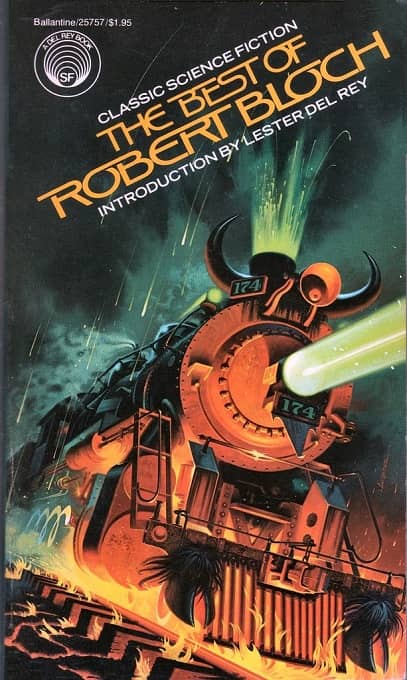 |
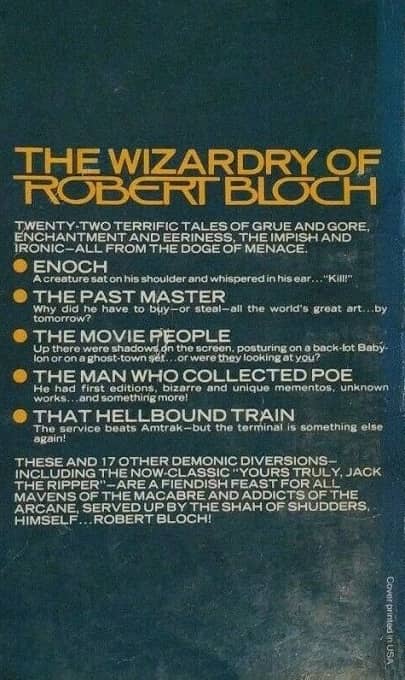 |
The Best of Robert Bloch (Del Rey, 1977). Cover by Paul Alexander
The Best of Robert Bloch (1977) was the thirteenth installment in Lester Del Rey’s Classic Science Fiction Series. Lester Del Rey himself gives the introduction to this volume. Paul Alexander (1937–) does his first cover for the series, a very lively one based upon Bloch’s folktale “That Hell-bound Train.” The afterword was by Robert Bloch (1917–1994) himself.
When John O’Neill began first doing posts on some of these Del Rey editions a few years ago, the one that most intrigued me was his post on this Bloch volume. I was of course familiar with Bloch as the author of Psycho (1959), which was famously made into the Alfred Hitchcock movie of the same name in 1960. I also knew that Bloch was part of the vaunted “Lovecraft Circle,” having exchanged letters as a young author with famed weird author H. P. Lovecraft, even having the honor of becoming a protagonist/victim, named “Robert Blake,” in one of Lovecraft’s tales: “The Haunter of the Dark” (1936).
But I hadn’t really read that much of Bloch. But buying The Best of Robert Bloch soon fixed that.
Like most writers who cut their teeth on the early pulps, Bloch wrote widely and in various genres. Most pulp writers, in order to make anything close to approaching a living, had to be able to write everything from sci-fi to suspense thrillers. Bloch did as well. But given his association with Lovecraft, and his fame in connection with Psycho, I would’ve thought that The Best of Robert Bloch would tend to focus more on horror, or horror-related themes. And there was much here that fits with that genre.
[Click the images for haunted-house sized versions.]
“Yours Truly, Jack the Ripper,” a tale focusing upon the famous serial killer, is clearly in this vein and one of Bloch’s most anthologized stories. This is curious and creepy little tale with a twist ending, something Bloch tends to enjoy. Also in the horror vein is “Enoch,” a fairly ingenious possession story with a chilling feel throughout. Bloch does a great job of playing on the demon-possession theme, but in a less conventional way. The first time I read through The Best of Robert Bloch, this was my favorite story.
I also appreciated the little horror tale “Catnip.” I had actually first experienced this story as an episode on a very short-lived horror anthology show back in my middle school days (1981–1982). The show was called Darkroom, with James Coburn as the Rod Sterling-like narrator/host. “Catnip” focuses upon Ronnie a punk biker-type who ends up crossing paths with an apparent witch and her familiar. Ronnie tries to dispose of both, but, evidently unsuccessfully. The story ends with Ronnie’s mother calling up to Ronnie without answer. She playfully asks, “Has the cat got your tongue?” I let your imagination fill in the rest.
The Best of Fredric Brown, edited by Robert Bloch (SFBC edition).
Cover by Richard Corben.
The creepiest tale by far in The Best of Robert Bloch is “The Hungry House,” a modern haunted house story. I think haunted house stories are difficult to pull off. But this one is right up there with Shirley Jackson’s The Haunting of Hill House. One of the most chilling scenes takes place during a cocktail party. A crowded room would push away any fear of ghosts, right? Check out this scene:
[Mrs. Hacker] had passed out, somebody mumbled something about a doctor, and somebody else said no, never mind, she’ll be all right in a minute, and somebody else said well, I think we’d better be getting along. For the first time everybody seemed to be aware of the old house and the darkness, and the way the floors creaked and the windows rattled and the shutters banged. Everyone was suddenly sober, solicitous, and extremely anxious to leave. (p. 67)
Several other tales have some horror-elements as well, but probably fit better with sci-fi, fantasy, or even fairy- or folktale. “That Hell-bound Train,” the winner of the 1959 Hugo Award for best short story, fits this latter genre. It’s a sort of classic folk setup of the devil attempting to barter for the protagonist’s, Martin’s, soul. The devil happens to show up as a conductor on a train though headed for — you guessed it — Hell. Like most characters in such stories, Martin thinks he can outwit the devil, and the reader does so as well, for awhile. The ending comes as no surprise, but the means by which the devil gets him is a bit of a surprise. The tale ends with a moral of sorts about how to live one’s life.
Many of Bloch’s stories in The Best of Robert Bloch are actually sort of moral tales or have moral lessons or warning. Many of his characters have failings and vices that catch up with them in the end. Such tales tend have a reassuring ring of the balances being righted; but some of his other tales are a bit more ambiguous and despairing.
Assorted 70s and 80s Robert Bloch paperbacks
For example, “The Funnel of God” is a bit of a psychedelic trip. Take this excerpt:
Harvey’s mouth opened, swallowing the universe in a soundless scream. He could not follow… grow into godhead. He could not go back to an Earth which no longer existed. He could only scream, and merge into a swirling nothingness, a funnel that engulfed him without an end… (p. 317)
However, Bloch also has a witty humor that often comes out in his stories. In “All on a Golden Afternoon” Bloch lets the reader know what a psychiatrist writes in his notebook during a counseling session with a young woman. Paraphrasing, the woman retells a dream where she’s falling down a hole. The psychiatrist writes “womb fantasy.” Later in the dream she finds a key. The psychiatrist writes “phallic symbol.” Ha!
Though Bloch is primarily remembered as a horror author today, The Best of Robert Bloch shows a wide range of talent that was clearly honed in the grist of the pulp days. Like several of these Del Rey “Best ofs,” Bloch’s work represents a bygone era, but there is much to savor and experience from the pen of this great pulpster. I recommend The Best of Robert Bloch.
Here’s the complete Table of Contents:
“Yours Truly, Jack the Ripper” (Weird Tales, 1943)
“Enoch” (Weird Tales, 1946)
“Catnip” (Weird Tales, 1948)
“The Hungry House” (Imagination, 1951)
“The Man Who Collected Poe” (Famous Fantastic Mysteries, 1951)
“Mr. Steinway” (Fantastic, 1954)
“The Past Master” (Blue Book, 1955)
“I Like Blondes” (Playboy, 1956)
“All on a Golden Afternoon” (The Magazine of Fantasy and Science Fiction, 1956)
“Broomstick Ride” (Super-Science Fiction, 1957)
“Daybroke” (Science Fiction Stories, 1958)
“Sleeping Beauty” (Swank, 1958)
“Word of Honor” (Playboy, 1958)
“The World-Timer” (Fantastic Science Fiction Stories, 1960)
“That Hell-bound Train” (The Magazine of Fantasy and Science Fiction, 1958)
“The Funnel of God” (Fantastic Science Fiction Stories, 1960)
“Beelzebub” (Playboy, 1963)
“The Plot Is the Thing” (The Magazine of Fantasy and Science Fiction, 1966)
“How Like a God” (Galaxy Science Fiction, 1969)
“The Movie People” (The Magazine of Fantasy and Science Fiction, 1969)
“The Oracle” (Penthouse, 1971)
“The Learning Maze” (The Learning Maze, 1974)
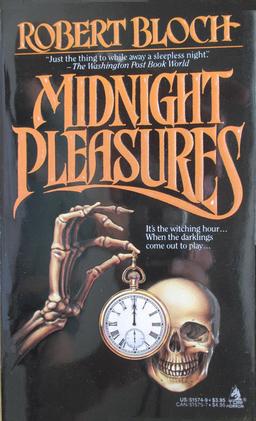 Our previous articles on Robert Bloch include:
Our previous articles on Robert Bloch include:
Vintage Treasures: The Best of Robert Bloch
“We Thought We Were Immortal”: Robert Bloch on J. Francis McComas, Eric Frank Russell, and Leigh Brackett
Vintage Treasures: Strange Eons
Vintage Treasures: Nightmares
Vintage Treasures: Midnight Pleasures
Birthday Reviews: Robert Bloch’s “The Fane of the Black Pharoah” by Steven H Silver
And our previous coverage of the Classics of Science Fiction line includes (in order of publication):
Smugglers, Alien Vampires, and Dark Dimensions: The Best of C. L. Moore by James McGlothlin
Rich Playboys, Mad Scientists, and Venusian Monsters: The Best of Stanley Weinbaum by James McGlothlin
Vampires, Frozen Worlds, and Gambling With the Devil: The Best of Fritz Leiber by James McGlothlin
Space Colonies, Interstellar Fleets, and The Martian in the Attic: The Best of Frederik Pohl by James McGlothlin
A Neglected Master: The Best of Henry Kuttner by James McGlothlin
A Shaper of Myths: The Best of Cordwainer Smith by James McGlothlin
Wings, Wind, and World-Wreckers: The Best of Edmond Hamilton by Ryan Harvey
Shark Ships and Marching Morons: The Best of C. M. Kornbluth by James McGlothlin
Drawing Out What it Truly Means to be Human: The Best of Philip K. Dick by James McGlothlin
Wit and Play in Classic Science Fiction: The Best of Fredric Brown by James McGlothlin
Dead Cities, Space Outlaws, and Planet Gods: The Best of Leigh Brackett by Ryan Harvey
Gods, Robots, and Man: The Best of Lester del Rey by Jason McGregor
The Best of Henry Kuttner by John O’Neill
The Best of John W. Campbell by John O’Neill
The Best of C M Kornbluth by John O’Neill
The Best of Philip K. Dick by John O’Neill
The Best of Fredric Brown by John O’Neill
The Best of Edmond Hamilton by John O’Neill
The Best of Murray Leinster by John O’Neill
The Best of Robert Bloch by John O’Neill
The Best of Jack Williamson by John O’Neill
The Best of Hal Clement by John O’Neill
The Best of James Blish by John O’Neill
The Best of John Brunner by John O’Neill
See all of our recent Vintage Treasures here.
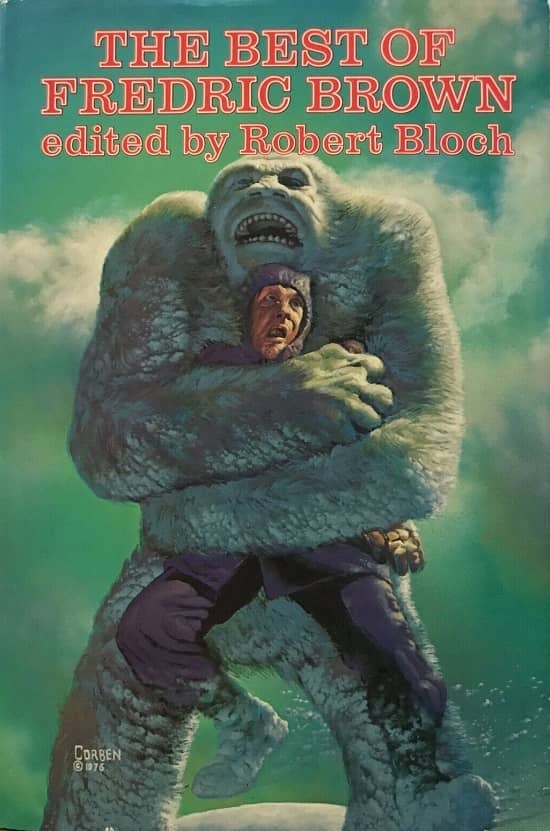
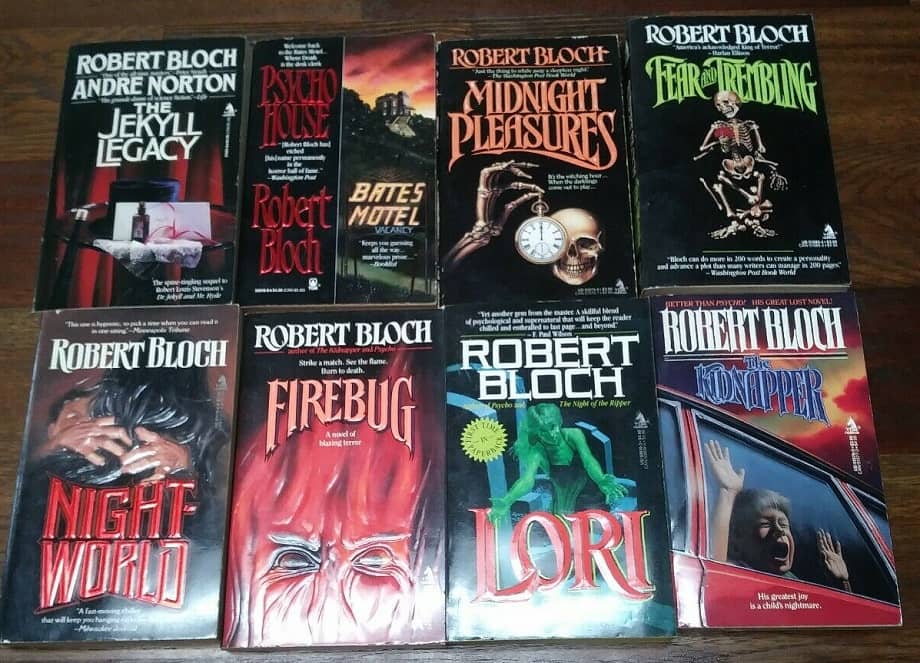
Good article. But the book captioned “The Best of Robert Bloch, Science Fiction Book Club edition” is actually the Best of FREDRIC BROWN, EDITED by Robert Bloch.
Brian,
You’re absolutely correct, of course! Totally my fault, not James’, for labeling the image incorrectly. The editor responsible has been sacked!
The Del Rey Books companion volume SUCH STUFF AS SCREAMS ARE MADE OF (1978) was essentially the best-of Bloch’s horror and suspense short stories, as a selection, that was meant to make up for the relative lack of that fiction in favor of his fantasy and sf in THE BEST OF volume.
https://socialistjazz.blogspot.com/2017/04/robert-bloch-in-some-of-his-best.html
IINM, those are ’80s and ’90s Bloch paperbacks, in the last photo.
And, I’l make this the Last Picked Nit, the title of the Hugo-winner isn’t “The” so much as “That Hell-Bound Train”…
> the title of the Hugo-winner isn’t “The” so much as “That Hell-Bound Train”…
Todd,
You are absolutely correct, sir! We managed to get it wrong three times in one article, and neither James nor I caught the error. Sharp eyes!
Thanks also for the link for SUCH STUFF AS SCREAMS ARE MADE OF. I bought that book years ago… it’s probably well past time to read it!